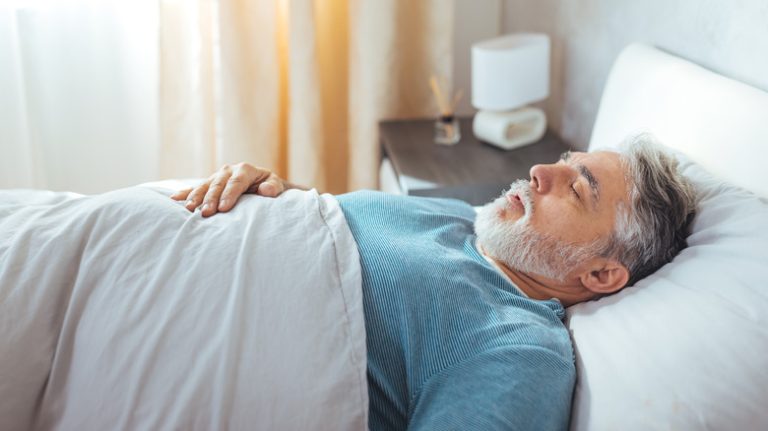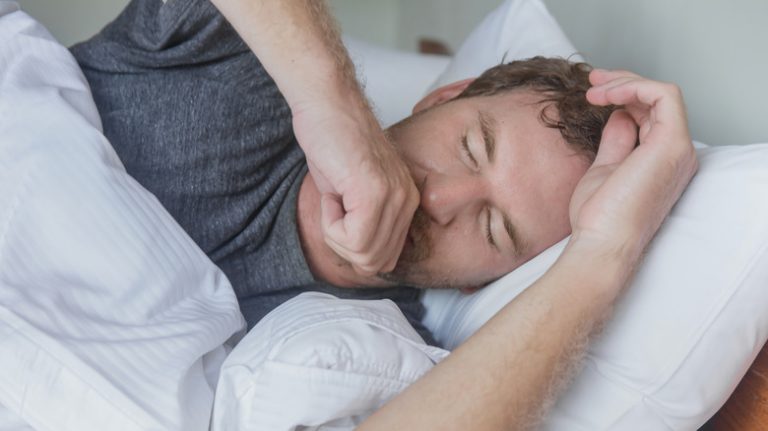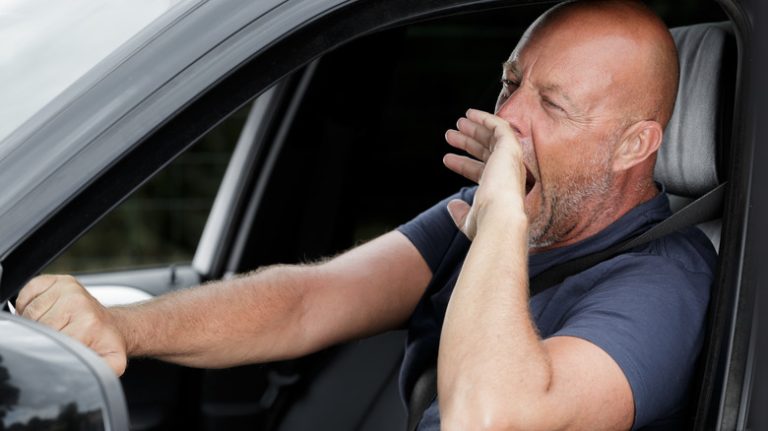Not been sleeping great recently? Join the club. Good sleep health is of vital importance, but almost everyone goes through a rough snoozing patch every now and again. This can be heightened enormously by the environments we’re living in, as well as real-world events (via The Lancet).
But sleep isn’t just affected by external factors. Quite often problems with sleep arise from behaviors we take part in daily. “When people suffer from insomnia or other sleep issues, it’s often because of something they’re doing, probably unintentionally, when they should be preparing for rest,” Michael Grandner, a member of University of Pennsylvania’s Behavioral Sleep Medicine Program and a psychiatry instructor, revealed in an interview with Health. The smallest things we do during our day, and particularly near bedtime, can get in the way of a good night’s sleep. Let’s have a look at some of the things you definitely shouldn’t be doing before bed.
Never have a nightcap

You may think a drink at the end of the night would send you off to eight hours of blissful dreams. Unfortunately, this is not quite correct. While alcohol is a relaxant that has a sedative effect on the nervous system, its consumption has also been linked to poor sleep quality, according to the National Sleep Foundation. Drinking just before bed can suppress REM sleep, the sleep stage in which we dream. During REM, the parts of the brain that help with learning are stimulated (via WebMD). When you drink at night, an imbalance is created between your REM sleep and non-REM sleep — and when the natural cycle of sleep is disrupted, the quality of your night’s sleep is worse, leaving you less rested.
This creates a “vicious cycle,” as the National Sleep Foundation detailed, “that consists of self-medicating with alcohol in order to fall asleep, consuming caffeine and other stimulants during the day to stay awake, and then using alcohol as a sedative to offset the effects of these stimulants.” While even moderate drinking can disrupt sleep, binge drinking can cause even worse sleep quality, and long-term drinkers can tend to suffer from chronic sleep issues.
Avoid having a big meal
Rushing in late from work, with an early start tomorrow? It might be tempting to chow down and head straight to sleep, but a big meal before bed can be an unwise move. Your sleep quality can suffer tremendously as “a very heavy meal will take a long time to digest, and will make falling asleep difficult,” dermatologist and psychiatrist Amy Wechsler told HuffPost.
The main reason for this is because of the digestion your body undertakes when eating food, and the gastrointestinal side effects that can occur when eating and then lying down immediately. Doing this can cause heartburn and indigestion. This is because when you eat before bed “[you] lose the effect of gravity that helps to keep the contents of the stomach down,” which causes a backflow of stomach acid and unpleasant gastrointestinal symptoms, Cleveland Clinic’s gastroenterologist Scott Gabbard told Self.
As Gabbard and Rajkumar Dasgupta, a clinician and Keck Medicine associate professor, explained, this can make both getting to and staying asleep difficult, as the digestive activity can cause regular small disruptions to your sleep pattern that can leave you groggy in the morning.
Don’t avoid eating altogether
Tero Vesalainen/Shutterstock
Eating just before bed is something we’re always told not to do for our sleep health, for reasons ranging from indigestion to weird cheese-fueled nightmares. Rigorously avoiding eating anything before bed, however, could have equally as disruptive an effect on your sleep. By not eating before bed, our bodies have no fuel to work with throughout the night. “In many cases, this can cause a drop in blood sugar which could actually be waking you up at night,” clinical psychologist Michael Breus, author of “The Sleep Doctor’s Diet Plan: Lose Weight Through Better Sleep” told The Healthy. Breus continued, saying, “When your blood sugar gets low, insulin is produced to help utilize fat stores, but this can be stimulating and keep you awake.”
A light snack like a teaspoon of raw honey will do, according to the expert, as it can help to stabilize your blood sugar throughout the night. Other great snacks before bed include a banana with almond butter, which can help to increase melatonin and magnesium levels before bed, or some yogurt, which can help to promote sleep through its calcium content, according to Healthline.
Never have coffee this late
Jazz3311/Shutterstock
File this one under “yeah, duh” all you please, but it bears repeating that caffeine before bed is a serious no-no. What’s more, you should not only stop drinking caffeine just before bed, but you should cease drinking it long before you turn out the lights. Caffeine has a half-life of between three to five hours, meaning that if you drink a cup of tea or coffee in the early evening, you could still have half of the caffeine content in your system by the time you hit the hay, according to the American Academy of Sleep Medicine. If you’re sensitive to caffeine, this can be hugely disruptive to your sleep.
That’s why you should stop ingesting caffeine roughly four to six hours before you go to bed, or even avoid caffeine after noon if you’re sensitive to it, says Verywell Health. And remember that it’s not just coffee, tea, and energy drinks that contain caffeine. Many types of soda, medications, and even chocolate contain levels of caffeine that can provide enough of a stimulant effect to disrupt your slumber. As everyone’s sensitivity to caffeine is different, keeping an eye on how different caffeine sources affect you is the best way to tailor your timings accordingly.
Don’t watch Netflix on your phone or laptop
Top CNX/Shutterstock
Apologies for snatching your late-night activity right out of your hands with this one, but watching Netflix (or anything) just before bed can have you tossing and turning all night. The rise of handheld technology has brought with it a bevy of health considerations, and one of them is the detrimental effect that these light-emitting devices have on sleep quality, as noted in research published in the Proceedings of the National Academy of Sciences of the United States of America (or PNAS).
The research shows how using light-emitting devices before bed can delay the natural circadian rhythm of the body and increase alertness before bed, meaning it takes a longer time to fall asleep. Using a phone, e-reader, or laptop before bed can also suppress the production of melatonin, a hormone involved in regulating sleep, according to WebMD, and disrupts and reduces the amount of REM sleep obtained throughout the night.
As 90% of Americans use electronics before bed, according to a survey published in the PNAS study, this is a tech epidemic of monumental proportions. To avoid your screens disrupting your sleep, try to create a technology-free space in the bedroom, suggests the National Sleep Foundation.
Never turn the thermostat up too high
Antonio Guillem/Shutterstock
On a cold winter’s night, nothing is cozier than a warm bedroom. Be careful throwing up the temperature too high, though, as the temperature in which you sleep can be a huge factor in its quality, according to WebMD. “When you go to sleep, your set point for body temperature — the temperature your brain is trying to achieve — goes down,” H. Craig Heller, Stanford University professor of biology, to the site. When your body temperature drops, it causes you to be able to sleep easier.
Naturally, “if you are in a cooler [rather than too-warm] room, it is easier for that to happen,” said Heller. But if your room is too hot (or too cold), it’ll not only take you longer to get to sleep, but it’ll also cause you to wake up more in the night, reducing the depth and overall length of sleep time. High temperatures can also affect your REM sleep quality. While optimal sleep temperature is subjective, differing from person to person, aiming to keep your bedroom between 65 to 72 degrees is a good idea.
Avoid having an argument
Torwai Studio/Shutterstock
“Never go to bed angry,” as the old saying goes. Turns out, doing this doesn’t just leave arguments unresolved and relationships in the balance, it also ruins your sleep. “Confrontations lead to a stress response, with your adrenal glands producing cortisol and adrenaline,” Dr. Robert S. Rosenberg, board-certified physician for sleep medicine and the author of “The Doctor’s Guide to Sleep Solutions for Stress & Anxiety,” told The Healthy. “This is the exact opposite of what you want if you’re trying to fall asleep easily.”
And once you’re elevated these hormone levels, you can’t just switch them off by “[waving] a magic wand [to] get them to return to normal levels,” according to Rosenberg. As both adrenaline and cortisol increase stress and alertness and disrupt sleep (per National Sleep Foundation), it’s healthy to either avoid conflict or to try to resolve any issues before you head to sleep. Argument resolution can help you avoid further impact and stress on your relationship and to yourself, and discussing things calmly and expressing your feelings can often help, as BetterHealth advises.
Don’t work out
Rido/Shutterstock
You’ve reached the end of the day and suddenly realize you’ve totally forgotten to work out. You’ve got a spare 30 minutes — you could just squeeze it in now, right? While regular exercise is an important part of sleep hygiene, capable of improving both sleep quality and quantity, as seen in a review of studies published in Advances in Preventive Medicine, when you exercise is an important factor for your sleep habits.
Generally, exercise during most of the day is fine, but moderate-intensity exercising up to 90 minutes before bed can be detrimental to sleep patterns, as it can raise your body temperature and increase endorphin levels, according to the National Sleep Foundation. This works against your body’s natural preparations for sleep when your body temperature lowers and your heart rate decreases.
That said, certain studies seem to find that vigorous evening exercise doesn’t have much of an impact on sleep quality, with one study published in Sports Medicine finding that sleep wasn’t altered in people exercising in the evening unless they were undertaking vigorous exercise within an hour of trying to go to bed. The most important thing is to pay attention to how your body responds to exercise. If you feel super hyped up after a workout, try to schedule them earlier in the day so you reap the benefits without potentially interfering with your sleep.
Avoid certain medications
Arpon Pongkasetkam/Shutterstock
When you take prescribed medications can have a surprisingly large impact on your sleep. “The effects may be subtle, but some medicines can make you alert for several hours after taking them,” Michael Grandner, a member of the University of Pennsylvania’s Behavioral Sleep Medicine Program and a psychiatry instructor, told Health. Certain antidepressants, for example, can interfere with sleep quite significantly when taken close to bedtime, as well as having the potential to worsen sleep disorders like REM sleep behavior disorder or sleep apnea, as research published in Current Psychiatry Reports shows.
Additionally, certain pain medications can cause gastrointestinal effects making sleep more challenging. On the other hand, there are medications that potentially work better when taken closer to bedtime. Blood pressure medication, for example, is more effective in reducing incidences of cardiovascular illness and death when taken before bed than in the morning, according to a study published in the European Heart Journal.
Never chug a ton of water
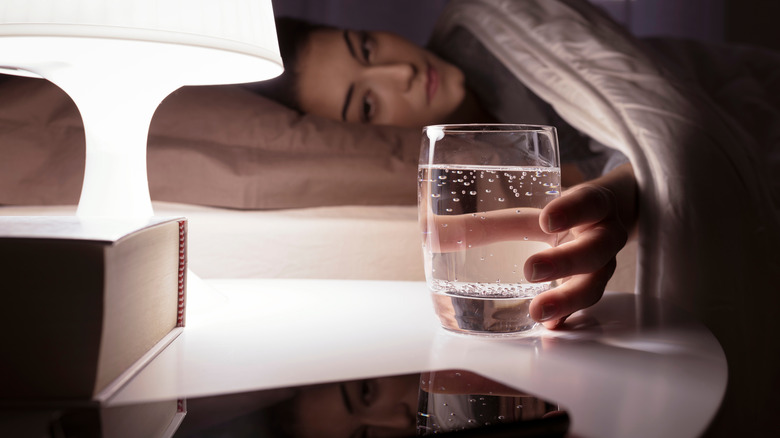
Stokkete/Shutterstock
Hydration is key for pretty much everything in life, and if you consider that sleep is an eight-hour window (if we’re lucky) in which you’re not drinking water, it makes sense to want to chug a big glass of it before bed. Doing so can be hellish for your night’s rest, though, thanks to the increase in the need to pee through the night, according to Healthline. Not only will it prevent you from dropping off, but the need to urinate can wake you up throughout the night — a condition known as nocturia – disrupting your sleep cycle and leading to poorer quality of sleep overall. As Healthline points out, chronic poor sleep can increase the potential for high blood pressure, high cholesterol, and an increased risk of heart attack or stroke.
That’s not to say you should drink less water, though. Drinking enough water throughout the day to avoid dehydration will improve sleep quality enormously, as the National Sleep Foundation points out. But drinking enough regularly in the daytime should help you stay hydrated through the night, and help you avoid the need for a quick liter before bed. It’s useful to avoid fluids one to two hours before bed as well as to avoid too many alcoholic or caffeinated drinks throughout the day, both of which have a dehydrative effect (via National Sleep Foundation).
Avoid checking your email
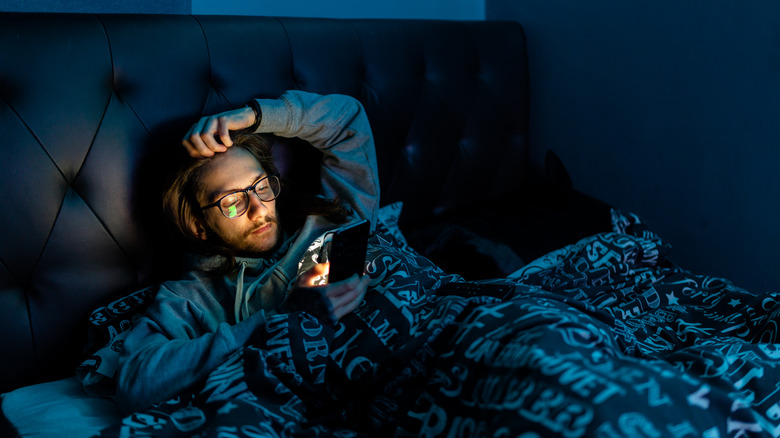
Simon Collins/Shutterstock
Hands up if you’re guilty of this one — we certainly are. In fact, 62% of millennials regularly check their emails in bed, according to a survey conducted by Adobe (via Inc). This new-age practice is dubbed telepressure — that is, the psychological state of constantly being available to respond to messages from other people, emails or otherwise, according to a study published in Stress and Health.
Unfortunately, this state of constant connection can have detrimental effects on our sleep. As the Stress and Health study observed, individuals who experience telepressure are more likely to suffer from poor sleep hygiene and increased levels of stress. In addition to this, telepressure has been seen to reduce levels of psychological detachment from work among employees, leading to a constant loop of stress and inability to switch off from your work tasks, as a study published in Psychologica Belgica shows.
To avoid this, a good strategy to implement is to remove your work email inbox from your phone. This will save you from having to see any work-related messages until you’re at your desk the next day.
Don’t have a cigarette
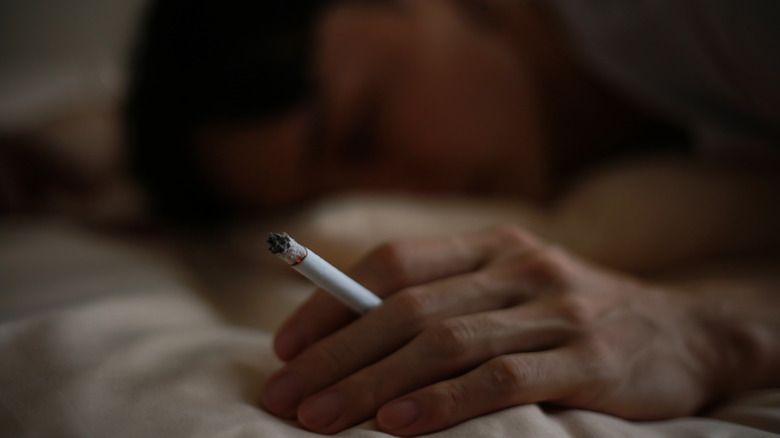
Yamasan0708/Shutterstock
Smoking rates have declined noticeably in recent years, from 20.9% of all adults smoking in 2005 to 14% of adults by 2024, according to the CDC. For those 14 out of 100 adults who still smoke, though, doing so before bed can be problematic for your sleep. “Nicotine stimulates the production of the wake-promoting neurotransmitter, acetylcholine,” Robert S. Rosenberg, the author of “The Doctor’s Guide to Sleep Solutions for Stress & Anxiety” and a board-certified physician for sleep medicine, told The Healthy. Nicotine is also present in smoking-adjacent products like vapes or nicotine patches.
In addition to the nicotine, smoking cigarettes also raises the risk of developing sleep apnea considerably, as the Mayo Clinic says. Understandably, avoiding nicotine before bed can be troublesome if you’re using a nicotine substitute throughout the day and night to try to quit smoking. According to Rosenberg, “If you are using a nicotine 24/7 patch and cannot sleep, talk to your health-care provider about removing it before bedtime.”
Avoid checking your socials
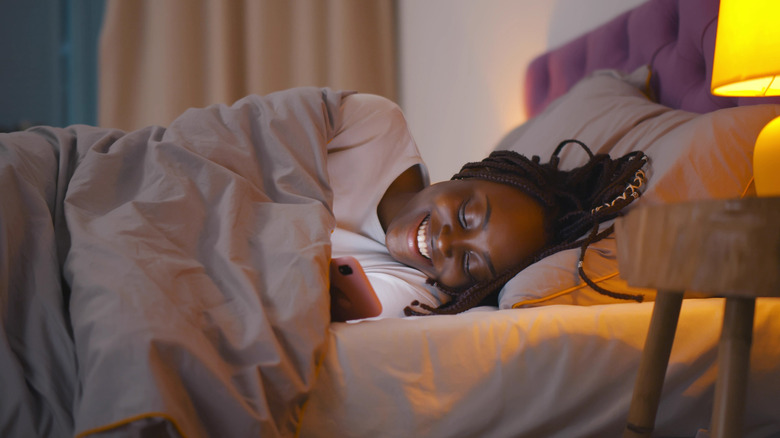
Nimito/Shutterstock
Asking some people not to check their socials before bed is like asking them not to breathe. But if we told you that doing so might be causing poor sleep, you might think twice before refreshing Insta in bed. There’s a strong association between social media use and poor sleep, as the National Sleep Foundation pointed out. More specifically, spending time on social media after getting into bed and before falling asleep is not only hugely common — over 70% of people in a study published by Sleep Health used social media in bed, with 15% of people spending over an hour or more per night using it — but those who use social media in bed are more likely to have insomnia, shorter sleep duration, and poorer mood.
The amount you check your socials throughout the day can also affect your sleep. A study published in the journal Preventive Medicine (via EurekAlert!) found that younger people who were on social media more frequently throughout the day were more likely to have sleep disturbances throughout the night. According to the study, it could be the frequency in which social media is checked, as well as how long is spent on the sites or apps, that could contribute to poorer sleep. The study authors suggest trying to curb checking social media too often in an effort to combat this.
Never take a hot shower
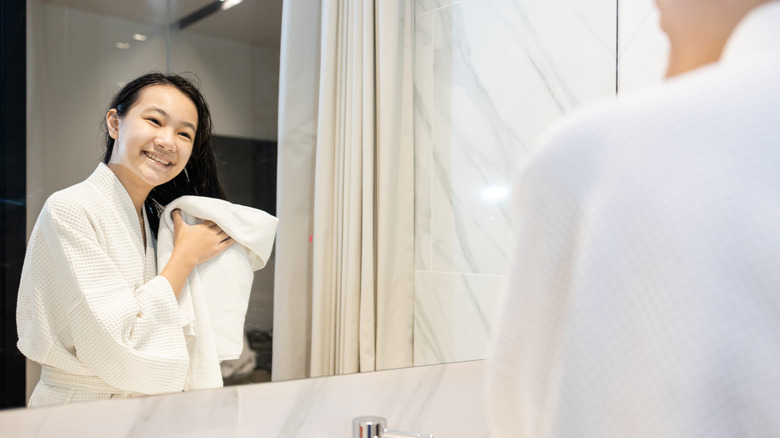
CGN089/Shutterstock
You may think that a hot shower before bed is the perfect way to unwind. But actually, having one could disrupt your sleep, as well as lead to other unexpected health consequences. “Showers often wake people up, so it might not be the best thing to do before bed,” Michael Grandner, a member of University of Pennsylvania’s Behavioral Sleep Medicine Program and a psychiatry instructor, told Health. A hot shower can raise your body temperature at a time when your body is trying to lower it to sleep more effectively, disrupting its natural process (via Sleep.org).
There’s also a big reason why you shouldn’t go to bed straight after a shower, particularly if you’re leaving your hair wet. Sleeping with wet hair can increase your chance of developing a fungal infection, resulting in dandruff or dermatitis, and increasing levels of fungus on your pillow that can worsen asthma, per Healthline. Heading to bed with your hair wet can also weaken it and increase its chance of breaking. As board-certified dermatologist and dermatopathologist Adarsh Vijay Mudgil told Healthline, “If you can’t avoid sleeping with wet hair, your best bet is leaving it down.”
